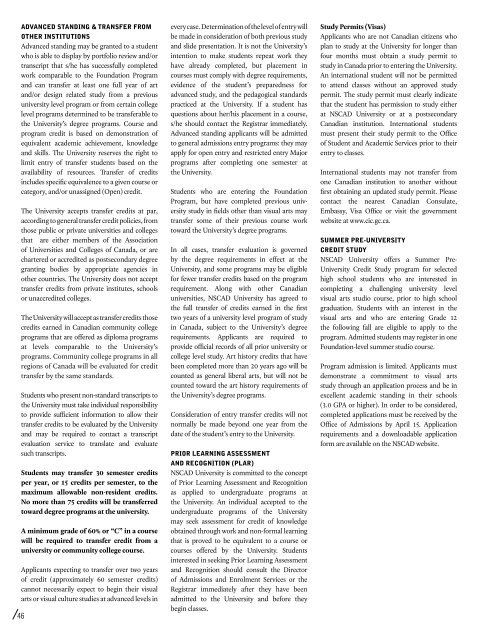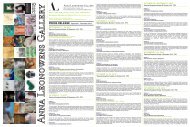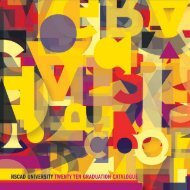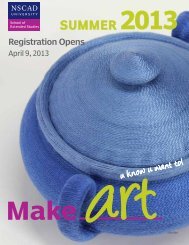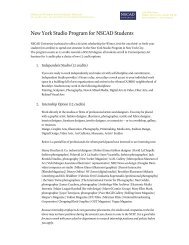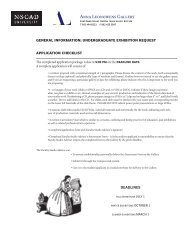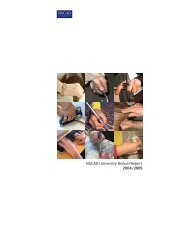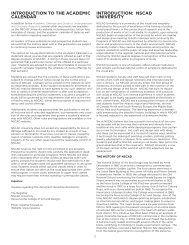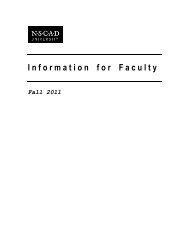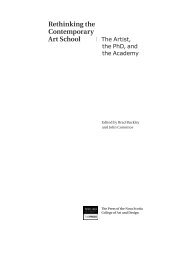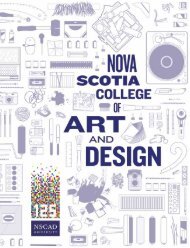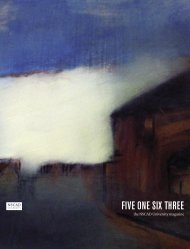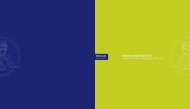2013/2014 academic calendar - Nova Scotia College of Art and ...
2013/2014 academic calendar - Nova Scotia College of Art and ...
2013/2014 academic calendar - Nova Scotia College of Art and ...
You also want an ePaper? Increase the reach of your titles
YUMPU automatically turns print PDFs into web optimized ePapers that Google loves.
ADVANCED sTANDING & TRANsFER FROM<br />
OTHER INsTITUTIONs<br />
Advanced st<strong>and</strong>ing may be granted to a student<br />
who is able to display by portfolio review <strong>and</strong>/or<br />
transcript that s/he has successfully completed<br />
work comparable to the Foundation Program<br />
<strong>and</strong> can transfer at least one full year <strong>of</strong> art<br />
<strong>and</strong>/or design related study from a previous<br />
university level program or from certain college<br />
level programs determined to be transferable to<br />
the University’s degree programs. Course <strong>and</strong><br />
program credit is based on demonstration <strong>of</strong><br />
equivalent <strong>academic</strong> achievement, knowledge<br />
<strong>and</strong> skills. The University reserves the right to<br />
limit entry <strong>of</strong> transfer students based on the<br />
availability <strong>of</strong> resources. Transfer <strong>of</strong> credits<br />
includes specific equivalence to a given course or<br />
category, <strong>and</strong>/or unassigned (Open) credit.<br />
The University accepts transfer credits at par,<br />
according to general transfer credit policies, from<br />
those public or private universities <strong>and</strong> colleges<br />
that are either members <strong>of</strong> the Association<br />
<strong>of</strong> Universities <strong>and</strong> <strong>College</strong>s <strong>of</strong> Canada, or are<br />
chartered or accredited as postsecondary degree<br />
granting bodies by appropriate agencies in<br />
other countries. The University does not accept<br />
transfer credits from private institutes, schools<br />
or unaccredited colleges.<br />
The University will accept as transfer credits those<br />
credits earned in Canadian community college<br />
programs that are <strong>of</strong>fered as diploma programs<br />
at levels comparable to the University’s<br />
programs. Community college programs in all<br />
regions <strong>of</strong> Canada will be evaluated for credit<br />
transfer by the same st<strong>and</strong>ards.<br />
Students who present non-st<strong>and</strong>ard transcripts to<br />
the University must take individual responsibility<br />
to provide sufficient information to allow their<br />
transfer credits to be evaluated by the University<br />
<strong>and</strong> may be required to contact a transcript<br />
evaluation service to translate <strong>and</strong> evaluate<br />
such transcripts.<br />
Students may transfer 30 semester credits<br />
per year, or 15 credits per semester, to the<br />
maximum allowable non-resident credits.<br />
No more than 75 credits will be transferred<br />
toward degree programs at the university.<br />
A minimum grade <strong>of</strong> 60% or “C” in a course<br />
will be required to transfer credit from a<br />
university or community college course.<br />
Applicants expecting to transfer over two years<br />
<strong>of</strong> credit (approximately 60 semester credits)<br />
cannot necessarily expect to begin their visual<br />
arts or visual culture studies at advanced levels in<br />
46<br />
every case. Determination <strong>of</strong> the level <strong>of</strong> entry will<br />
be made in consideration <strong>of</strong> both previous study<br />
<strong>and</strong> slide presentation. It is not the University’s<br />
intention to make students repeat work they<br />
have already completed, but placement in<br />
courses must comply with degree requirements,<br />
evidence <strong>of</strong> the student’s preparedness for<br />
advanced study, <strong>and</strong> the pedagogical st<strong>and</strong>ards<br />
practiced at the University. If a student has<br />
questions about her/his placement in a course,<br />
s/he should contact the Registrar immediately.<br />
Advanced st<strong>and</strong>ing applicants will be admitted<br />
to general admissions entry programs: they may<br />
apply for open entry <strong>and</strong> restricted entry Major<br />
programs after completing one semester at<br />
the University.<br />
Students who are entering the Foundation<br />
Program, but have completed previous university<br />
study in fields other than visual arts may<br />
transfer some <strong>of</strong> their previous course work<br />
toward the University’s degree programs.<br />
In all cases, transfer evaluation is governed<br />
by the degree requirements in effect at the<br />
University, <strong>and</strong> some programs may be eligible<br />
for fewer transfer credits based on the program<br />
requirement. Along with other Canadian<br />
universities, NSCAD University has agreed to<br />
the full transfer <strong>of</strong> credits earned in the first<br />
two years <strong>of</strong> a university level program <strong>of</strong> study<br />
in Canada, subject to the University’s degree<br />
requirements. Applicants are required to<br />
provide <strong>of</strong>ficial records <strong>of</strong> all prior university or<br />
college level study. <strong>Art</strong> history credits that have<br />
been completed more than 20 years ago will be<br />
counted as general liberal arts, but will not be<br />
counted toward the art history requirements <strong>of</strong><br />
the University’s degree programs.<br />
Consideration <strong>of</strong> entry transfer credits will not<br />
normally be made beyond one year from the<br />
date <strong>of</strong> the student’s entry to the University.<br />
PRIOR LEARNING AssEssMENT<br />
AND RECOGNITION (PLAR)<br />
NSCAD University is committed to the concept<br />
<strong>of</strong> Prior Learning Assessment <strong>and</strong> Recognition<br />
as applied to undergraduate programs at<br />
the University. An individual accepted to the<br />
undergraduate programs <strong>of</strong> the University<br />
may seek assessment for credit <strong>of</strong> knowledge<br />
obtained through work <strong>and</strong> non-formal learning<br />
that is proved to be equivalent to a course or<br />
courses <strong>of</strong>fered by the University. Students<br />
interested in seeking Prior Learning Assessment<br />
<strong>and</strong> Recognition should consult the Director<br />
<strong>of</strong> Admissions <strong>and</strong> Enrolment Services or the<br />
Registrar immediately after they have been<br />
admitted to the University <strong>and</strong> before they<br />
begin classes.<br />
Study Permits (Visas)<br />
Applicants who are not Canadian citizens who<br />
plan to study at the University for longer than<br />
four months must obtain a study permit to<br />
study in Canada prior to entering the University.<br />
An international student will not be permitted<br />
to attend classes without an approved study<br />
permit. The study permit must clearly indicate<br />
that the student has permission to study either<br />
at NSCAD University or at a postsecondary<br />
Canadian institution. International students<br />
must present their study permit to the Office<br />
<strong>of</strong> Student <strong>and</strong> Academic Services prior to their<br />
entry to classes.<br />
International students may not transfer from<br />
one Canadian institution to another without<br />
first obtaining an updated study permit. Please<br />
contact the nearest Canadian Consulate,<br />
Embassy, Visa Office or visit the government<br />
website at www.cic.gc.ca.<br />
sUMMER PRE-UNIVERsITY<br />
CREDIT sTUDY<br />
NSCAD University <strong>of</strong>fers a Summer Pre-<br />
University Credit Study program for selected<br />
high school students who are interested in<br />
completing a challenging university level<br />
visual arts studio course, prior to high school<br />
graduation. Students with an interest in the<br />
visual arts <strong>and</strong> who are entering Grade 12<br />
the following fall are eligible to apply to the<br />
program. Admitted students may register in one<br />
Foundation-level summer studio course.<br />
Program admission is limited. Applicants must<br />
demonstrate a commitment to visual arts<br />
study through an application process <strong>and</strong> be in<br />
excellent <strong>academic</strong> st<strong>and</strong>ing in their schools<br />
(3.0 GPA or higher). In order to be considered,<br />
completed applications must be received by the<br />
Office <strong>of</strong> Admissions by April 15. Application<br />
requirements <strong>and</strong> a downloadable application<br />
form are available on the NSCAD website.


